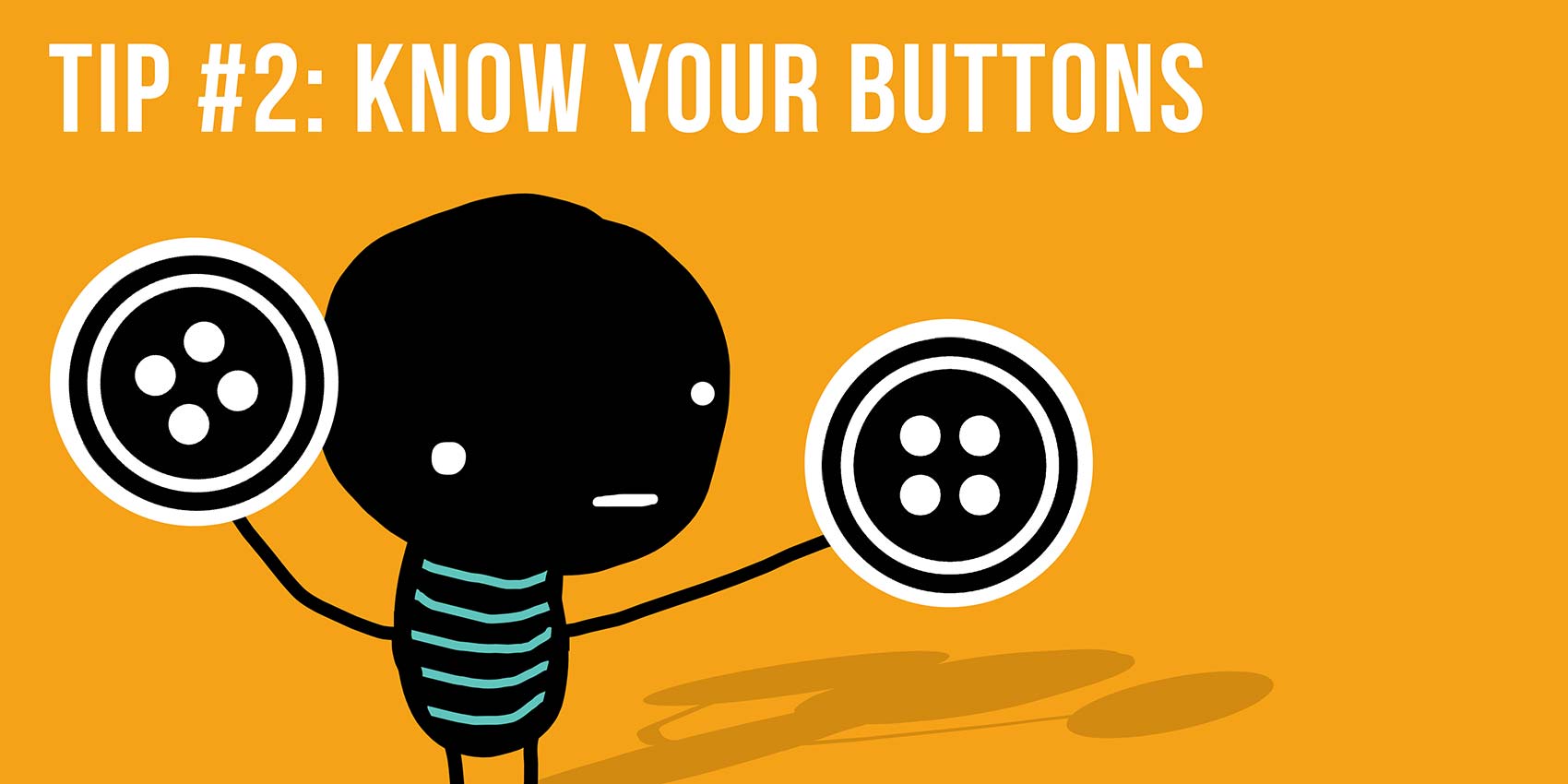18 Apr Tip 2: Know your buttons

What is a button? Well, of course you know the button that is on your sweater and you are familiar with the buttons that you press on your phone or computer, but that’s not what the focus of this post is.
In the world of getting to know your self, buttons are like “hot spots” that people can touch (figuratively, but not literally) that make you particularly mad or insecure (meaning uncertain, or worried) or scared or whatever you may feel when someone irritates you. Buttons are areas in your life that can “set you off.” They are topics or words or events to which you are sensitive but other people might not be. Pretty much everyone has a button or two or three or five.
Here’s an example:
If you hate it, really hate it, (super duper, might pop a gasket, flip a switch, go totally crazy kind of hate) when people don’t call when they say they will, that is a “button” for you. So when people don’t call you (when they say they would), they are “pushing your button.”
You get angry and annoyed, maybe even hurt, when the person doesn’t call. But why? Your friend, Jane, has no problem when someone forgets to call. But for you, well, it sends you into hyperspace.
What’s up? Maybe you feel a bit rejected? A little abandoned? When you were little did Mom say she would call or be there on time and then she didn’t? Did Dad say he would take you to the big game time and time again but then he just disappointed you? If this was the case, then you might end up feeling like you can’t trust people to do what they said they would. So any event in your life that triggers the feelings of disappointment and a lack of trust will be a “button.”
(Remember that this is just an example, but these buttons usually stem from some previous experience/s.)
When you figure out your buttons and from where they came, then you can control them rather than let them control you.
For example, you may think:
Ugh, Sally didn’t call me again when she said she would. Oh, wait, that’s a button for me. I’m going to ask her why before I get really upset. Just because she didn’t call doesn’t mean that she doesn’t like me. Then when I hear what she has to say, I’m going to let her know that it bugs me when she says she’s going to call and she doesn’t. That way, maybe she’ll be more careful while I try to be less sensitive.
If Sally is a good friend, then hopefully she’ll be more careful. But she might not be. Sally might just be an airhead about those things and if that’s the case, you can learn that her missed calls are about her and not about you (you won’t take it personally!). Telling Sally how you feel and talking yourself through the situation is an adaptive response to your button. What does adaptive mean? Well, That’s another post… if you need another example of a button, head to the next post. If you understand the concept of buttons already, skip it and head to the second post covering adaptive and maladaptive responses.




WLKHS2217
Posted at 15:22h, 08 MarchMy button is when people talk negative things about me behind my back. I’d rather know what they were talking about me rather than not know it at all, even if it’s extremely mean or hurtful. When someone is keeping something from you when you have a right to know can be just as hurtful, if not worse.
WLKHS2210
Posted at 15:21h, 08 MarchMy button is when my parents make comments on what I “should” be doing like joining clubs I really don’t want to join. Another button I have is when one of my friends or family members takes it so personal and gets mad at me for something that’s not my fault.
wlkhs2207
Posted at 15:16h, 08 MarchMy “buttons” or things that set me off are when people are mean to other people for no reason. In my opinion, if you do not like someone you should not take the time out of your day to talk about them or make them feel bad about themselves. Also people with bad attitudes. People with bad attitudes are the worst kind of people because your attitude and energy are contagious, and if you have a bad attitude no one is going to want to be around you.
WLKHS2218
Posted at 15:15h, 08 MarchI have a few buttons, but my most sensitive button is when people start arguments or conflict/drama for literally no reason and make a big deal out of it by cursing and insulting. Even if the situation doesn’t involve me, I still have a chance of becoming livid because the most reasonable thing to do is not to make something that isn’t even a problem into one, especially by raising your voice or insulting others.
wlkhs2221
Posted at 15:14h, 08 MarchMy button is when people talk about me when Im in front of them and think because they are whispering I wont notice. Also when people think they are smarter than me so they can’t include me in the conversation.
WLKHS 2208
Posted at 15:12h, 08 MarchFrom prior experience, I believe my “button” would be when people make assumptions without confronting me or even knowing me. To me, assuming is the worst thing a person can do in most situations, and this is why I’ve stopped myself from doing the exact same. Assuming anything whether it be end results, personal situations, or something as little as a characteristic, takes the power out of your hands and allows someone to accept something that could possibly be completely wrong.
WLKHS2215
Posted at 15:11h, 08 MarchMy button would probably be when people overcrowd me too much. My friends and family are all great people, but sometimes I get really overwhelmed when I am with them. It will usually be if they are too loud or are talking too much. If that happens I don’t want to get mad at them, so I’ll just walk away and hope that they leave me alone.